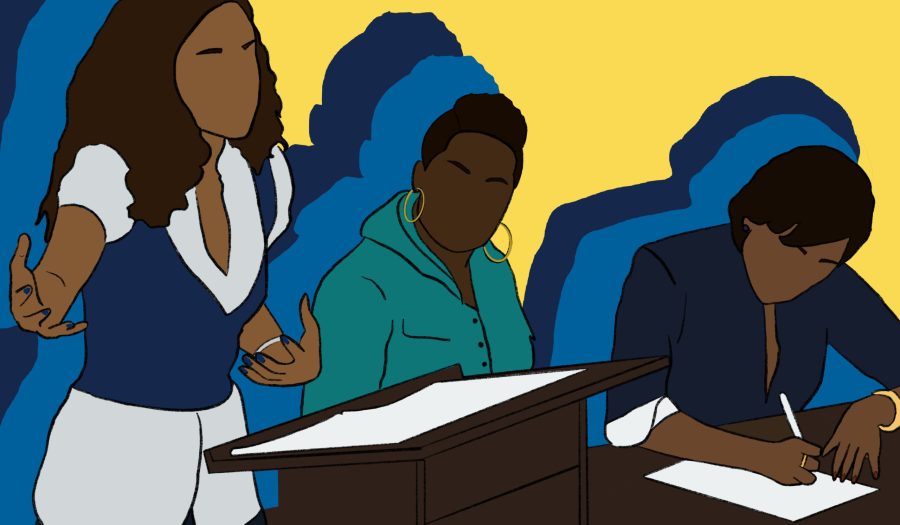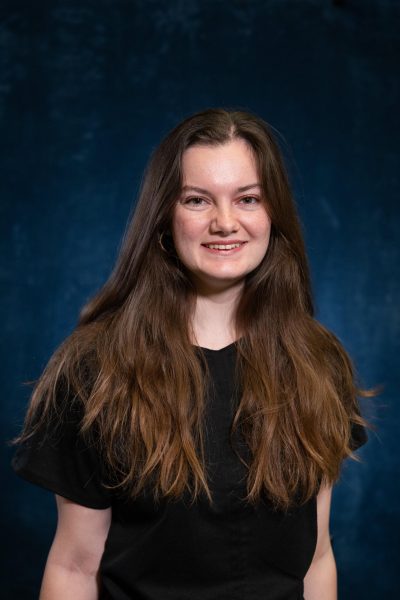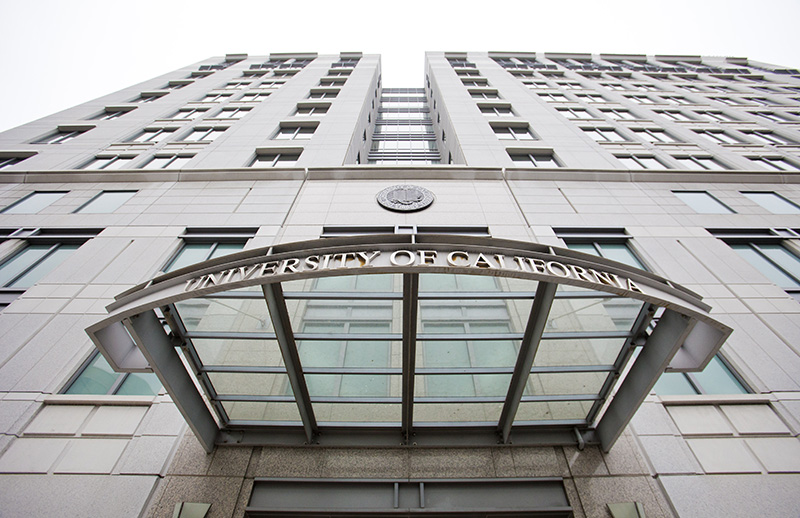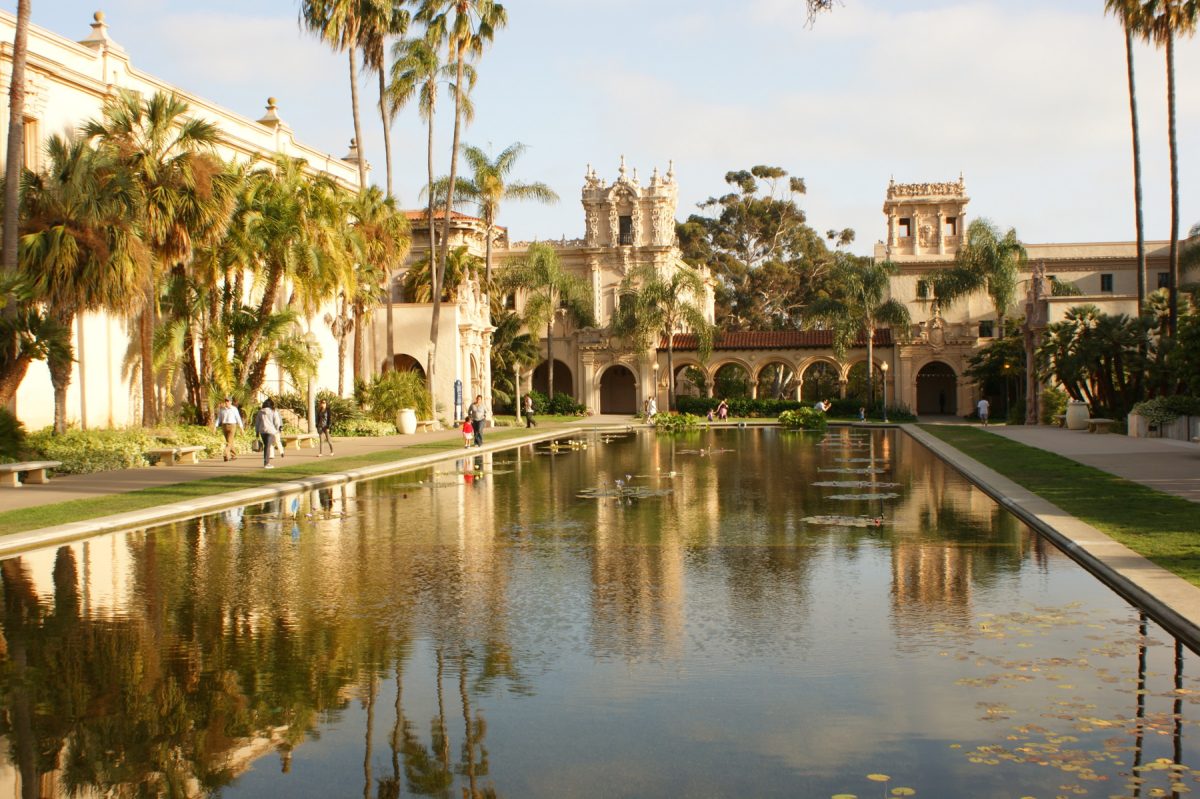Week 7
In their Week 7 meeting, A.S. senators discussed projects such as a campus referral service and gave updates on current projects. Vice President Adrianne Blackshire announced an all-student summit in protest of the quarterly meeting with the University of California Office of the President (UCOP) and the council went over how to change the active directory (AD) passwords.
First, Sydney Harrison, a speaker for CALPIRG, a student organization centered on the reduction of climate change, gave an update on the group’s mission to eliminate single-use plastics from California to curb plastic pollution.
Additionally, CALPIRG has been working with Assemblymember Laura Friedman in support of AB-26, a new bill that would ban single-use plastics in delivery packages. Additionally, CALPIRG is raising support for AB-2146, a bill for bees, butterflies, and other pollinators by reducing the usage of Neonics, a form of herbicide.
Then, Campuswide Senator Daniel Soria introduced his project, the campus referral service. The service will help organizations submit requests and hearings to the A.S. Council and help connect organizations to it more easily. Soria stated that more updates will be provided in the upcoming weeks.
Senator Anna Zick discussed her correspondence with the Triton Transfer Hub and mentioned plans for a student-led transfer council to help transfer students. However, this is still under development.
Next, Vice President of External Affairs Adrianna Blackshire spoke about her recent University Affairs (UA) quarterly meeting with University of California President Michael Drake and the rest of the UCOP. Blackshire explained that, despite expressed requests of UA students to not be merged with other organizations, UCOP plans to go against these requests.
“Due to the circumstance that UCOP has decided to pretty much go against our desire to not be merged with other organizations such as UCGCP and the Council of Presidents, we have decided as members of UA to boycott the quarterly meeting.” Blackshire elaborated.
Instead of attending, student representatives will attend a UC student policy summit on Feb. 28.
Following this, the council moved on to reports of standing committees. The Finance Committee approved the following items.
- F2: Allocation of $404.80 from programming funds to Alpha Epsilon Delta for UCSD Alpha Epsilon Delta
- F3: Allocation of $3,298.34 from Programming Funds to Muslim Student Association for Tarbiyya Seminar
However, they tabled the following for two weeks.
- F1: Allocation of $60k from Unallocated to the Booster Bucks Initiative
- F4: Allocation of $15,000 from Student Organization Programming Funds to General Unallocated funds
Additionally, the Legislative Committee appointed Maria Charles as A.S. Election Manager.
Then, the council went over the reports of external committees. First-Year Senator Xavier Lopez presented on behalf of the cyberspace and governance committee in an update on the Jan. 10 campus notice, where it stated that students have to change their Active Directory (AD) password during Winter Quarter as part of a cybersecurity initiative. According to the Jan. 10 notice, the deadlines for password changes will be staggered over several weeks in order to not overload on the systems and Service Desk. The Active Directory Account, better known as the Triton Link account, is where students can access information such as class registration and financial aid.
Lopez provided a tutorial on how to change your password, which is also available at this link here. Additionally, Lopez provided a website to find whether your password has been compromised, which can be found here.
Senator Allyson Muir for the Library Student Advocacy Council spoke about the tunnel in the first level of the Geisel Library. Because the tunnel is too dark for studying, the council hopes to find a way to repurpose the space.
Senator Eng and the rest of the Executive Director of Campus Performances and Events office search are currently working with a search firm, Isaacson Miller, to hire an executive director for the new Epstein Family Amphitheater. At the moment, Eng said that they are looking for students’ input on how students and student organizations can use this space as well.
Senator Johnson spoke about the Mentoring for All Committee and their meeting on February 15. The Committee hopes to reach better outreach and wants to mostly reach out to first and second-year students.
Finally, in the end, Senator Ramos discussed her plans for a Student-Worker Parking project, a carpooling service for students to get to campus. However, when VP Lara asked about how COVID regulations will be taken into consideration, Ramos admitted that aspect will need more thought.
Week 8
In their Week 8 meeting, Housing Dining Hospitality, Basic Needs, and Student Legal Services were discussed by the A.S. Council. Additionally, project managers went over housing policies, off-campus resources, and new building projects being done in response to the housing crisis.
To start this meeting, there were special presentations led by HDH Associate Vice Chancellor Dr. Hemlata Jhaveri.
Associate Director of Housing Stacy Travis, Director of Residential Experience Megan Fox, and Associate Director of Housing Administrative Services Chris Dice went over the new housing policy for the 2022–2023 school year.
Housing applicants will be divided into 5 priority groups:
- Scholars in UC San Diego programs that provide four years of housing guarantee or mandate living on campus as a condition of their offer
- New incoming first-year and transfer students
- Returning second-year students, including second-year transfer students who resided in on-campus housing for at least two of three quarters in the 2021-22 academic year
- Remaining second-year students, including 2nd year transfers
- Remaining 3rd and 4th years
HDH said that it expects that groups 1, 2, and some of 3 will be housed. Group 3 will be selected by a lottery system and groups 4 and 5 will have a chance to apply for housing by joining the waitlist.
Travis also provided important dates for room selection.
- Now–March 1: Continuing student housing application
- March 8–14: Housing contract issued
- March 9–20: Living-Learning Community, I-House and opt-in for Gender Inclusive Housing
- April 14 and 22: Lottery date and time, and available space online
- April 29–28: Room selection sign-up by community
- May 3: Notification of delayed assignment
Students will have to apply for housing by May 1 and accept an offer by May 9. Continuing students who submitted a Continuing Student Housing application by the stated deadline, but were not able to receive a housing contract, will be moved to the waitlist. They’ll have to update their record to stay on the waitlist.
Meanwhile, students in priority group 4 and 5 will apply once when the waitlist is open. Students on the waitlist will be offered spaces as they become available and will be able to choose any open undergraduate space. For more information, you can refer to the HDH website.
Next, the Hub Basic Needs Housing and Education Coordinator Kameo Quenga and Assistant Marissa Islas went over resources that can help students with the housing crisis. Students can refer to the off-campus housing office for resources to help them with off-campus living. The Off-Campus Housing website also has property listings, roommate searches, and emergency resources.
Following them, Student Legal Services Director Jon Carlos discussed the resources available to students. This includes free confidential counseling, education, and referrals for all students.
For off-campus students or students looking for off-campus housing, SLS also offers help with security deposits, roommate conflicts, lease reviews, and repairs/insurance. Students looking for their website can find it here.
UCSD Capital Program Manager Dennis Brown then went over the plans for the Theatre District Living and Learning Neighborhood. The new undergraduate residence will be located next to Revelle College and the La Jolla Playhouse.
It will be 900,000 sq. ft. and will house 2000 undergraduates. Along with rooms, there will also be recreation and wellness areas throughout. More information can be found here.
Project Manager Bryan Macias then covered the new ideas for Pepper Canyon West Housing. It will be built on the grounds Pepper Canyon Lounge, known colloquially as Camp Snoopy, is currently on.
Pepper Canyon Lounge will be demolished in the Summer of 2022 and the new Pepper Canyon West will be completed by Fall 2024. It will be made of two towers, of 22 and 23 stories respectively. It will house 1300 residents and the ground floor will be used for retail. It will have new public features also, including a canyon trail that goes into a courtyard of buildings and a large park along Gilman Drive. This will be used mostly for third and fourth years. For more information can be found here.
Project Leader Matthew Smith covered the Marshall District Living and Learning Neighborhood plans. It will be a new learning and living neighborhood at Marshall College, with 2000 beds and construction will begin in 2023.
Smith also stated that the new Triton Transfer Hub will be located in the Triton Center Project, also known as the Triton Pavillion. It will also include the Center for Global Education and the new node for the teaching and learning commons.
This will be built in the central campus, near the Gilman Super Loop and Price Center. This project will go into construction in 2022 and will be done around 2025.
Jhaveri also established that 704 spaces have been identified for triples. Jhaveri said the decision was made to alleviate the housing crisis in San Diego.
Following these presentations, Food and Housing Resources Assistant Vice President Natalie Chiang gave her special presentation on the budget of the Professional Closet Program. This is a project the office hosts every year to address difficulties students may have accessing professional clothing. This program seeks to support students by providing them $50 gift cards to purchase appropriate interview outfits from stores like Target or Amazon. Chiang gave the budget proposal of $200,000 from Associated Students to support 400 students to find professional wear.
Senator Serena Zheng announced her revival week project called Renewal Winter. This project will give out 200 care packages to students studying nursing. This event will take place on March 7 out on Muir Quad where care packages with goodies like ramen and face masks will be given out to nursing students only.
Senators Callahan, Kimiko Walker, and Griffith gave updates on their projects. Senator Rosario told the council of two new projects: one is a scholarship committee, and the other is a new art installation at Sixth College. VP Lara introduced a mentor-mentee program for the A.S. council and said mentor-mentee pairs will be announced by Week 10.
President Manu Agni went over plans for Spring Break. Agni noted that like last year, he hopes that more people opt to stay in San Diego than go out of the city to reduce the transmission of COVID-19 as a result of traveling in and out of San Diego. Additionally, Agni reminded people to self-test after returning to campus after the break.
Agni addressed issues with the Pronto App that students use for the trolley and buses, where the barcode that students scan to pay their fare would not work. He said that he discussed it with those behind the app and an update will be coming soon in the upcoming weeks.
Finally, Agni explained that he was working to get more funding for the library to get outdoor seating.
Senator Lopez reiterated that the Chief Information Security Officer announced that starting March 1, students need the UCSD VPN to access computers and networks.
Finally, Senator Nomani gave an update on Uncle Italian. The restaurant in the Student Center is currently not open still due to low foot traffic. However, it plans to change its concept as well as upgrade its alcohol selling license to allow them to sell cocktails.
A.S. Council meetings take place at 6 p.m. every Wednesday and are open to students. Students can participate in these meetings by joining the Zoom link or joining on Facebook Live.
Art by Ava Bayley for The UCSD Guardian
This article was updated on Sunday, Feb. 27, at 8:27pm to provide additional context to presentations that occurred during the meetings.

















John Burl Smith • Mar 11, 2022 at 5:24 pm
Young Students/Voters are Smarter than They Look!!!
By John Burl Smith author of “The 400th From Slavery to Hip Hop”
Students on one side of Prof. Frank White’s history class, at Central High in Independence OR., were shown a holographic image of a tree and asked, “What color is the tree?” Students on one side of the room answered green, while those on the other side said white, prompting him to ask, “Why are your peers lying?” This very simple exercise demonstrated to students that their perceptions are built on and limited by one’s perspective and exposure. The information (things one hears and sees) controls most attitudes and strongly views in life. I encountered this lighthearted and enlightening story in a USA Today article by Erin Richards, Natalie Pate, Meghan Mangrum and Ryan W. Miller, which I believe every adult, young and old, should read to clarify current madness in education.
America’s salvation, I believe, will be “young people today are so much smarter than most people think, looking at them. “They are so much smarter than they look!!!” Their problem is, “No other young generation has had to survive an older generation, only concerned with what is going on in their heads, compounded by their desire for power at the expense of the younger generation.” Older Americans are acting like kids about education, even though they are not learners. They are making judgement about what is allowed to enter their brains. The older generation is taking to social and regular media like banshees, storming school board meetings, threatening board members, pulling guns, even assaulting teachers, especially if their unruly child clowns in class. All the while, nuclear war drips from Putin’s every word! If you do not have a serious mind, what will it take to awaken you? The young are all we have left, if democracy is to be saved!
However, I believe democracy’s survival depends on the fact young voters are far more perceptive and intelligent than their parents and others, fermenting chaos around education. I witnessed this type of uprising by adult political types firsthand, once Stokley Carmichael screamed “black power” (1966), accompanying Dr. Martin Luther King, Jr. on the “Walk Against Fear,” after James Meredith was gunned down, headed to Jackson, MS. Young activists were told by older leaders to, “sit down and shut up.” We were not allowed to have a voice, as today’s young people. Taking to the streets, we demanded a place at the table, where decisions about our futures were being made, but we were not allowed in the room. Those in the room were making decisions that favored “big business and the rich 1/3.
Activists decided expanding the electorate was the only solution, so we began demanding “18-Year-Olds have the right to vote.” However, conservatives and moderate Democrats claimed that giving children—18-Year-Olds—the right to vote would “demean democracy in America.” But, today it is the older generation that became insurrectionists and stormed the Capital on 1/6, trying to “destroy democracy!” Nevertheless, back in 1972 Rich Nixon’s stolen re-election frightened neocons and moderate Democrats so much they voted for the 26th Amendment. The 26th Amendment prohibits the federal government, state and local governments from using age to deny any citizen, 18 years of age the right to vote. In addition, Congress through the federal government has the power and ability to “enforce” and challenge any law or procedure that prohibits 18-Year-Olds access to voting.” That fact brings the current discussion to the Republicans 2020 voter suppression scheme, which most voters do not understand?
Prompted by the police murder of George Floyd and the outcome of 2020 presidential election, most amazingly, young people responded with such an outpouring of concern, they brought young people into the street across the world. Their awakening fueled the election of Joe Biden as President. Looking at the prospect of the same response from young voters in 2022, Republicans launched a voter intimidation effort. The hard left turn from racism toward justice for all by young voters, sent Republicans legislatures over the edge. Republicans made voting harder. Their draconian measures are based on imaginary “voter fraud,” pointing the finger at black voters. Republicans doubled down on the racism Richard Nixon used to become president in 1968. Nixon’s presidency showed Republicans they could make any dubious claim about Black Americans, and white people will support it without questions. This is where the 2020 census enters the picture on the side of young voters.
The 2020 census revealed that the 18-Year-Old demographic will be the largest voting electorate in the 2022 midterm election. Republican Party polling indicated ahead count in 2019 will not favor them, hence their current voter suppression scheme. Publicly, they intimated it was aimed at Black people, but in fact, it is designed to intimidate all young voters. The 2020 census showed 18-Year-Old voters will be almost twice the size of the 50-Year-Old and up demographic. Republican voter suppression is about maintaining power, the same as Nixon was in 1968, when progresses battled Chicago police in Grant Parks, during the Democratic Presidential Nominating Convention.
However, today young voters do not need to take to the street to gain power; you already have it in your hands. That power is the vote; all you need do is show up at the poles to cast it. The Republicans voter suppression scheme is an intimidation program to frighten and deter 18-Year-Olds from voting. They know the 26th Amendment gives 11th and 12th graders the vote. You are domiciled with parents and were born in America. Those are the only requirements to cast a ballot. Immigrant and older voters may have problems establishing these criteria, but they cannot stop 11th and 12th grade voters.
Consequently, 11th and 12th graders have as much power as the president of the United States of America; he (so far) has only one vote. Activists of my day had no idea, when we began pushing for 18-Year-Olds to vote, that one day they would constitute “a majority.” For the first time, 11th and 12th graders have the opportunity to elect a US Congress sensitive to their needs and issues. With that power, 11th and 12th graders can choose which party and those individuals who will exercise power in the next Congress. The midterm elections will be a test of whether young progress voters have enough courage and political savvy to appeal to high schoolers and get them to vote. Young voters have the numbers, the question is “do they have the character to lead America and save democracy!!!!